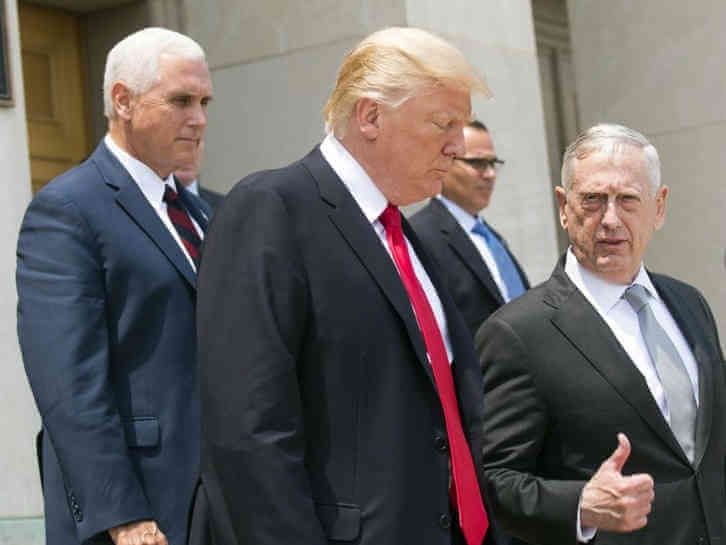The Supreme Court, on January 22, agreed to US Solicitor General Noel Francisco’s request that it stay the two nationwide preliminary injunctions issued in December 2017 by federal district judges on the West Coast blocking President Donald Trump’s ban on military service by transgender individuals from going into effect.
It is important to note upfront that the court’s action was not a ruling on the underlying merits of the case nor did it halt all the injunctions blocking the transgender ban from going into effect. The high court’s action involved only two of the four nationwide injunctions that have been issued by district courts around the country.
Another critical issue is the question of whether the ban the military plans to implement — announced by former Defense Secretary James Mattis in February of last year — is sufficiently different from what Trump proposed in 2017 that it is no longer a constitutionally impermissible categorical ban.
The vote was 5-4, with Justices Ruth Bader Ginsburg, Stephen Breyer, Sonia Sotomayor, and Elena Kagan indicating that they would have denied Francisco’s applications for stays.
Although the stays from the high court mean that the Trump administration’s transgender military ban is no longer blocked by those two injunctions, it is still blocked by an injunction issued by a federal judge in Baltimore.
The Supreme Court issued these two stays “pending disposition” of the Trump administration’s appeal of the two rulings in the Ninth Circuit Court of Appeals and any appeal for high court review that results.
While issuing the two stays, the Supreme Court denied the solicitor general’s petitions to leapfrog the Ninth Circuit and take its appeals directly to the high court. The Ninth Circuit has not yet ruled on the administration’s appeal of the two West Coast district court rulings.
The Supreme Court’s action did not immediately allow the Defense Department to implement the ban. That awaits a ruling by District Judge George L. Russell, III, who is still considering the government’s motion to dissolve the nationwide preliminary injunction issued in Baltimore on November 21, 2017, by District Judge Marvin J. Garbis, who retired this past June. The case was then reassigned to Russell.
On November 30, Russell issued his only ruling in the case so far, largely affirming an August ruling by Magistrate Judge A. David Copperthite on disputed discovery issues. At that time, Russell rejected the administration’s contention that some of Copperthite’s “findings of fact” were unreasonable. Key among those findings was Copperthite’s conclusion that Defense Secretary James Mattis’ version of the ban announced in February 2018 was still a ban on military service by transgender people, despite differences from the original version the White House described in an August 2017 memorandum.
Earlier this month, the US Court of Appeals for the DC Circuit vacated a similar preliminary injunction that Judge Colleen Kollar-Kotelly issued on October 31, 2017 and directed her to reconsider her conclusion that Matts’ version of the ban was essentially the same as the one Trump originally laid out and on which she issued her 2017 injunction.
The DC Circuit panel unanimously ruled, based on the government’s allegations about the differences between the two policies, that her conclusion was “clearly erroneous.”
The DC Circuit’s ruling is not binding on Russell, because Maryland is under the jurisdiction of the Fourth Circuit Court of Appeals, but it may influence his thinking.
The government’s position in all four of the pending cases challenging the constitutionality of the ban is that the Mattis policy was significantly different from the version of the ban described in Trump’s August 2017 memorandum — and so all four preliminary injunctions against that August 2017 version should be vacated.
The key is that the administration contends that the Mattis policy, which bans service by individuals who have been diagnosed with gender dysphoria, is no longer a categorical ban of all transgender service members, as described in Trump’s notorious tweets of July 26, 2017.
For one thing, the Mattis carves out an exception, allowing transgender individuals who are already serving to continue doing so despite being diagnosed with gender dysphoria, although those who have not transitioned when the new policy goes into effect will not be allowed to do so and still remain in the service. This exception, of course, contradicts the government’s argument that individuals diagnosed with gender dysphoria are not fit to serve.
For another thing, the Defense Department contends that because not all individuals who identify as transgender have either been diagnosed with gender dysphoria or desire to make a medical transition, the disqualifying factor has effectively been shifted by the Mattis policy from gender identity to gender dysphoria. Consequently, the administration argues, the district courts’ conclusion that the ban discriminates on the basis of transgender status in violation of equal protection no longer applies. Instead, the ban is based on a medical condition — a factor on which the courts have always shown deference to military expertise and judgment.
The Supreme Court’s action does not grant the government’s request to dissolve the two 2017 preliminary injunctions from the West Court district courts — by Judges Marsha J. Pechman in Seattle and Jesus Bernal in Riverside, California. So, the stays should not be interpreted as rulings on the merits. The high court is merely agreeing to the administration’s request to stay the effect of those injunctions while the Ninth Circuit decides whether to dissolve them.
In the meantime, all four district courts are dealing with contentious arguments, with the government refusing to comply with the plaintiffs’ discovery demands, making it difficult for the courts to proceed with the cases.
These cases are raising significant issues about the extent to which the government should be forced to disclose details of its decision-making process that are crucial to determining whether the policy they are now defending was adopted for constitutionally impermissible reasons.
Attention now focuses on Judge Russell in Baltimore, whose eventual ruling on the government’s motion to dissolve Judge Garbis’ preliminary injunction will decide, at least for the moment, whether the transgender ban goes into effect or remains blocked while the litigation continues. If Russell follows the lead of the other district judges, he will deny the motion and Solicitor General Francisco will likely petition the Supreme Court to grant a stay similar to the ones issued on January 22. But if Russell finds the DC Circuit’s analysis of Judge Kollar-Kotelly’s ruling persuasive, the ban may go into effect, even as all four cases challenging the ban continue to be fiercely litigated by the plaintiffs.
As to the stays issued on January 22, the Supreme Court said that if the government is unhappy with how the Ninth Circuit rules and appeals to the high court but that petition is denied, “this order shall terminate automatically.” If the high court grants review in the Ninth Circuit cases, the stay would remain in effect until it rules on the government’s appeal.



































